Nowadays, English is a world language spoken by many people across the planet, at least as a second language. Its influence has found reach because of business, technology, and culture. It may not be your native tongue, but you’ll definitely be able to relate to getting in a twist over this often-confusing, often nonsensical language.


We will prove to you that English is not such an easy language to learn—and that all its rules are completely bonkers. After running through a bit of vocabulary and a little grammar, you’ll feel like you’ve just taken a ride on the roller coaster of the mind.
At least we will agree on one thing—the people who designed this language had a sense of humor.
Boom!
We can’t rap—like, at all—but here are examples of words that rhyme. Whoever comes up with this kind of stuff must have a lot of time on their hands. Still, when you rely on words as a livelihood, you can’t help but notice these kinds of things.


Now we would like you to pay attention to the last part of this sentence when you are asked to consider why “bomb” is not pronounced “boom” when that exact noise is what you get when a bomb goes off. This pun is so witty that this poster must be a lyrical genius.
What What?
English is flawed, and you don’t need to be a language expert to know that. Just look at the example below. Using two words back to back in one sentence would have you asking, “what were we saying again?” Then you have to double back and say it again.

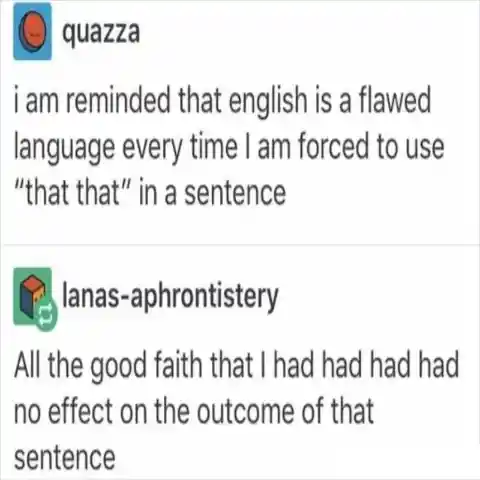
Now that that was said, we also would like to comment on the following comment that was said. It looks horribly intelligent, and yet it’s correct. How did the language ever become the global language of the world? Is there any hope for humanity with a medium like this?
Cat Lovers Pun
We can't unsee what this person pointed out. The last entry on their list of words containing the word "meow" caught us off guard. They start out with seemingly innocuous ones like "meowed" and "meowing," then all of a sudden, BAM! "homeowner" at the end.


“Owner,” while looking like the “meow,” when put next to “home.” is not pronounced in a similar way to meow. It's spoken as if it were two independent words because of the compound nature of the term. The secret meow has now been exposed thanks to this poster, and now this knowledge can never be put back in the box.
C That?
It is certainly fun to go with friends and family to the ocean whenever possible. It is good to catch a little tan during the vacation before going back to your monotonous average everyday living. It boggles the mind how this person still has the brain cells thinking of this word pun.


Each of the three c's in the proper noun "Pacific Ocean" is pronounced differently. It's just incredible! Here, in the space of one syllable, we find a "c" spoken softly, hardly, and with a "sh" sound. We're willing to wager that you've never heard of this crazy fact before.
Makes Me Tear Up
They say English is easy, but seeing these kinds of words side by side, it’s amazing anyone ever managed to learn the language. These two words, “tear” and “tier,” are spelled differently but are pronounced the same—which is so puzzling!
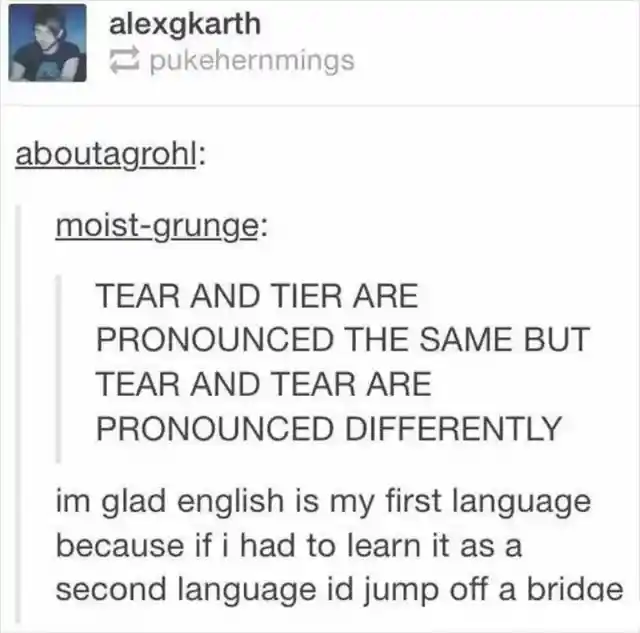
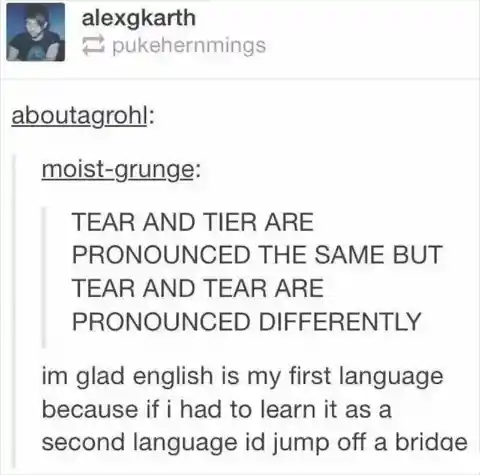
On the other hand, “tear” (crying) and tear (ripping) are spelled the same but have completely different pronunciations. You need to have context clues to know what the author is talking about, but it’s crazy that they’re written this way.
Twisted Thoughts
Now we give caution to those who are not very familiar with the language or if you have an accent because even if you are a native speaker, this tongue twister is a bit of a doozy. Just say those words together fast enough ten times, and you will hurt your tongue.
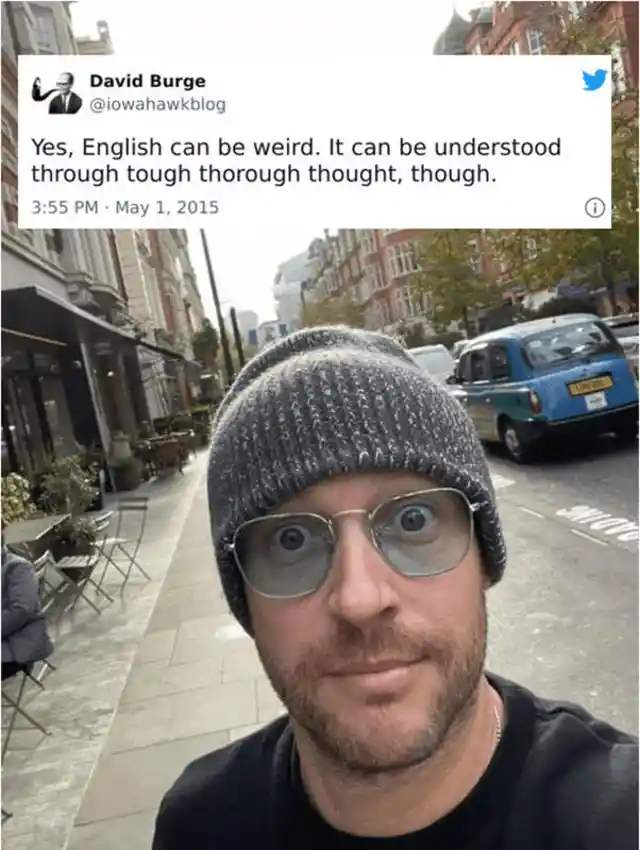
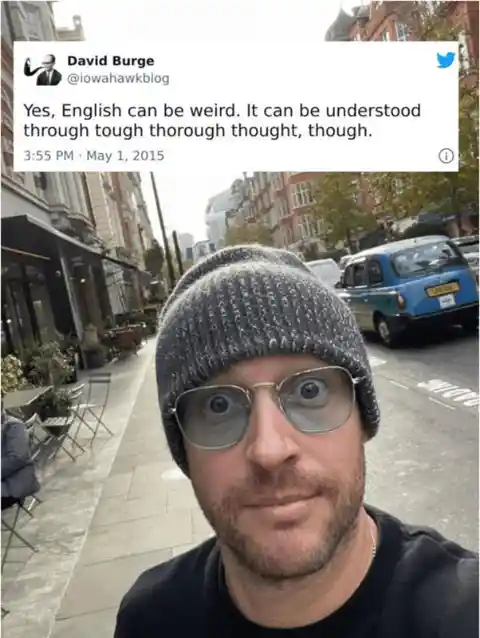
The fact that the statement makes perfect sense is hard for our brains to accept. In order to grasp what they are saying, you have to stop and think about it for a while. Now say it five times as rapidly as you can. We dare you!
What Kind Of Call?
So these two phrases may seem the same, but they are entirely different. One is flirtatious, and the other one evokes the feeling of total embarrassment—so do not confuse the two, or there will be dire consequences.
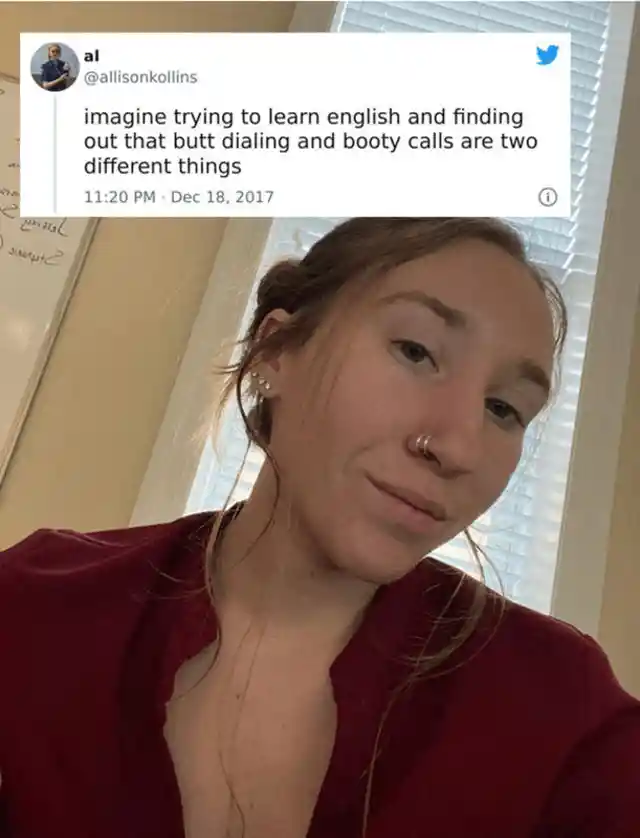

A butt dial is when you call someone on your mobile phone while it's in your pocket. “Booty calling” is—well, it’s phoning someone for a late-night smooch—now let’s leave it at that. You should keep the phrases separate in your mind.
The Only Thing That Matters
This English puzzle is pretty tricky and a little bit fun. Well, it depends on what you mean by “fun” because playing this game on your own might soon make you realize that you have to be incredibly careful where you place this innocent-looking word.
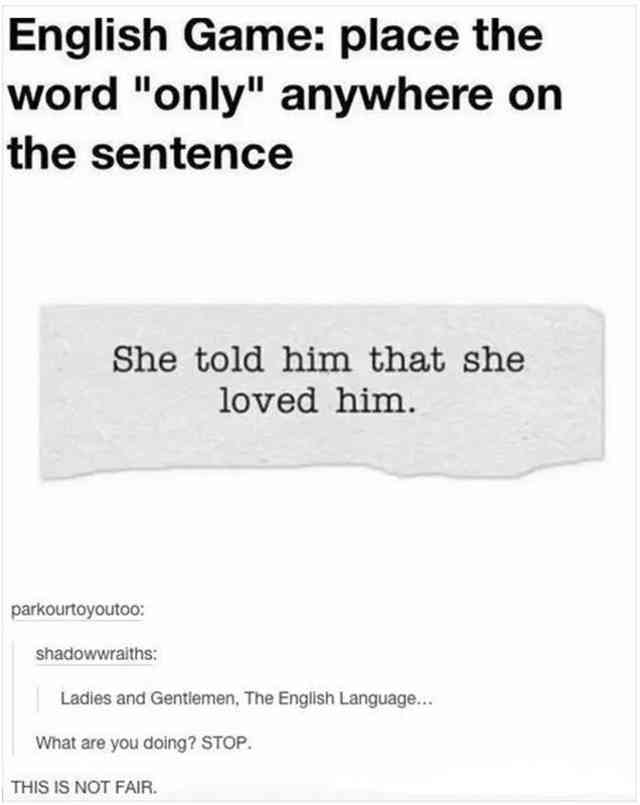
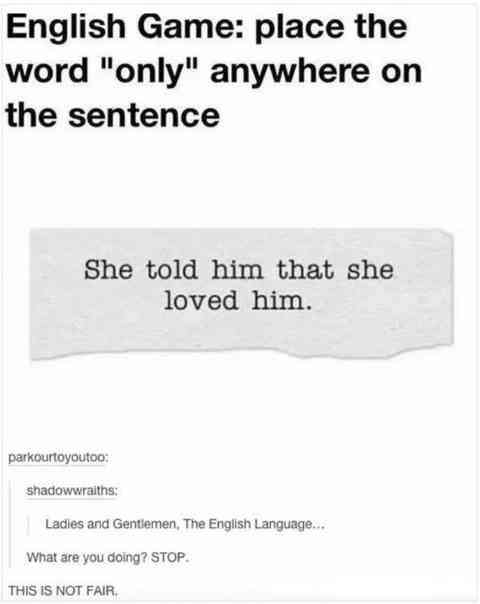
Depending on where you put "only," the meaning of this simple line varies considerably. "Only" at the start of a phrase signifies something different than at the end. Almost every rendition of the line tells a different narrative. Okay, the English language can be perplexing and cool—but only sometimes.
Opposites Work Well Together
So this guy must have everything figured out. You might imagine that he knows everything, and nothing slips past him. Imagine all the things that he notices. He caught something as hard to miss as these two words when compared with each other.


If you only look at the words, they're opposites. Water and fire are opposites, at least according to the four-element philosophy. Falling is the reverse of flying—hence they are opposites. We have no idea how this guy reached his conclusion. We’ll have what he’s having!
Pronunciation Is Tricky
For the most part, English uses five vowels, but occasionally even six. Still, when you think about all the different vowel sounds a word might have, it seems like we have a lot more! This post perfectly illustrates how difficult English can be or how much fun it can be when you find an example that works.
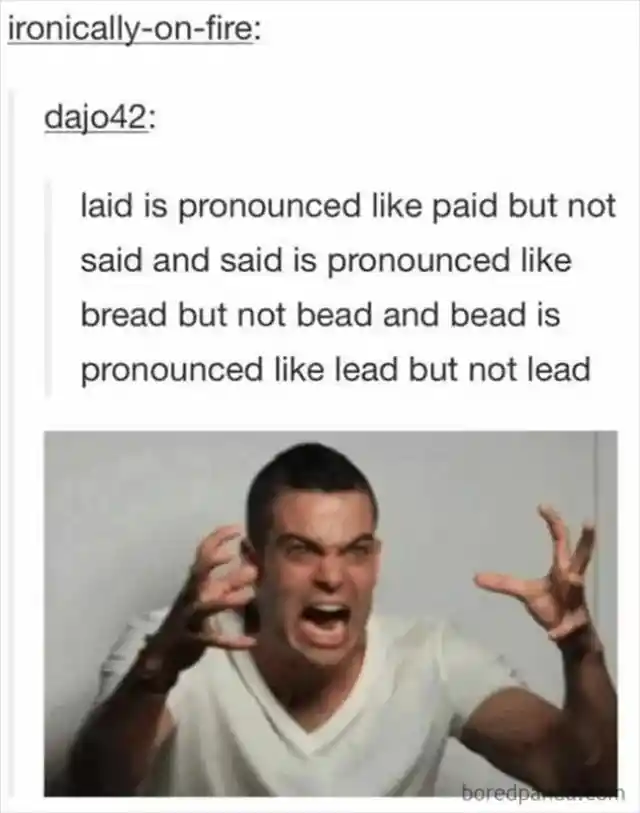
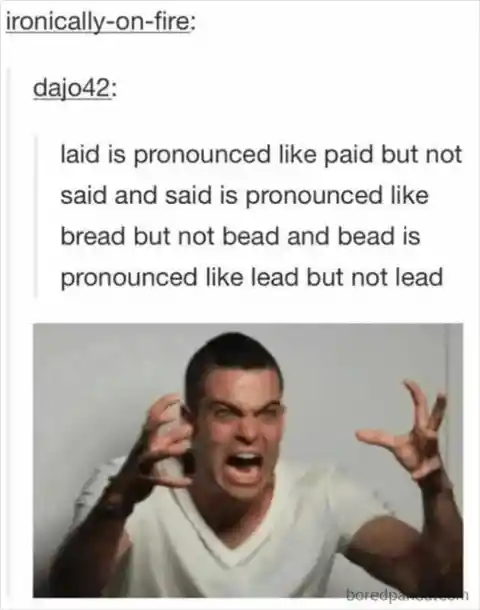
The vowel combinations at the end of words like "say" and "lay" are identical, yet the two words couldn't be more unlike in pronunciation. And then they go on to say that "said" rhymes with "bread" but not "bead," and now we're baffled. Why do you have to be this way, English?
Good Suggestion
So hear us out—we think we should consider this guy’s suggestion. Think about this for a moment. No kidding, because if not, then we will never be content with this content. It’s impossible to object to this objective fact.
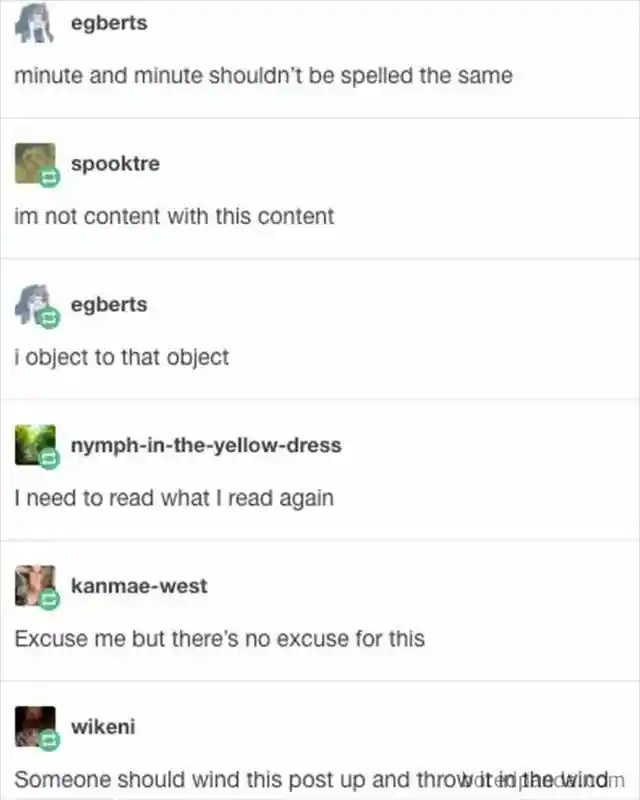
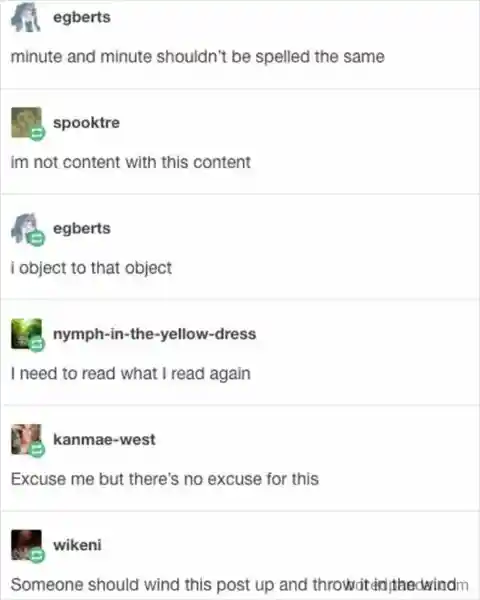
Each speaker gave a separate example of a homophone or two spelled and pronounced differently. We like "I object to that object." It's remarkable how many confusing terms exist in one language. Why can’t you just tell us where a word needs stressing when it’s a verb, huh, English?
The Letter Q
This may come as a surprise, but we think "queue" is one of the most superfluous English words. Why be excessively lengthy when it's just unnecessary? Why waste those additional u's and e's when you can just pronounce it as "Q"? Seems like padding to us.
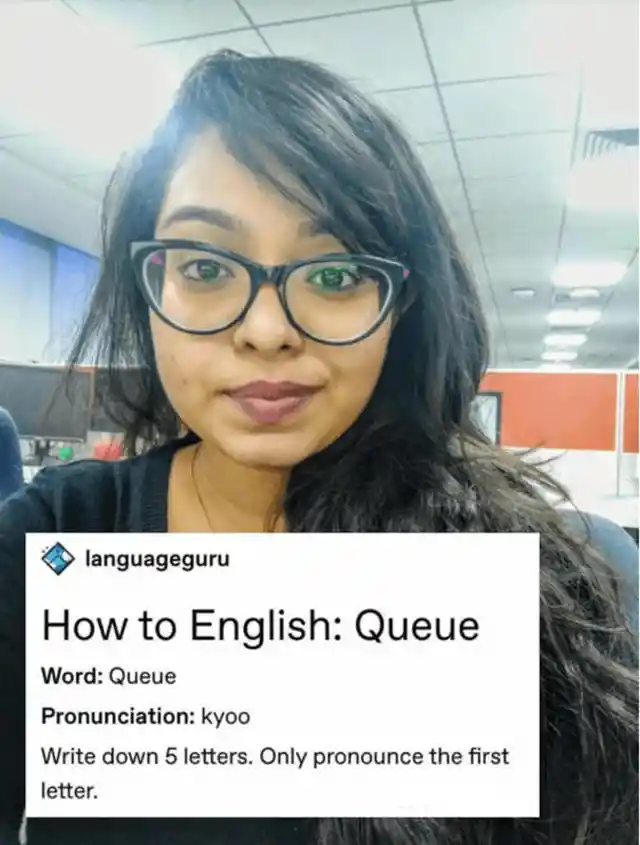
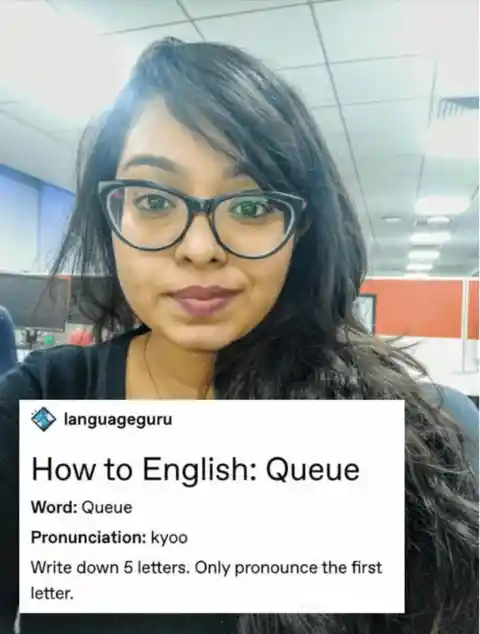
The French word queue literally means "tail," making it a more fitting and amusing term for a line. It's not clear why the word "queue" has an extra three vowels at the end. There's no use in even asking why. We guess we’re all stuck with this mad language forever.
Where Did It Grow?
Where do words come from? Are they all-natural, and were the farmers that grew them from small little seedlings? No wonder this post made a lot of noise on Twitter. Saying that “X” is a made-up word will get you lots of attention on your social media.
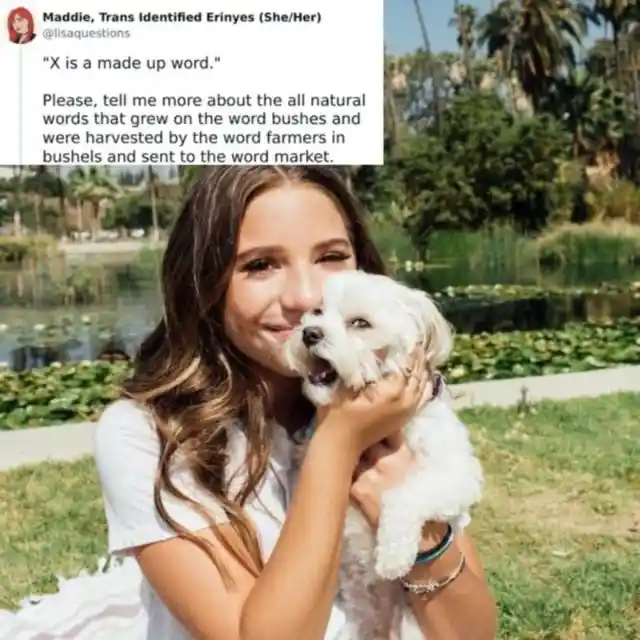
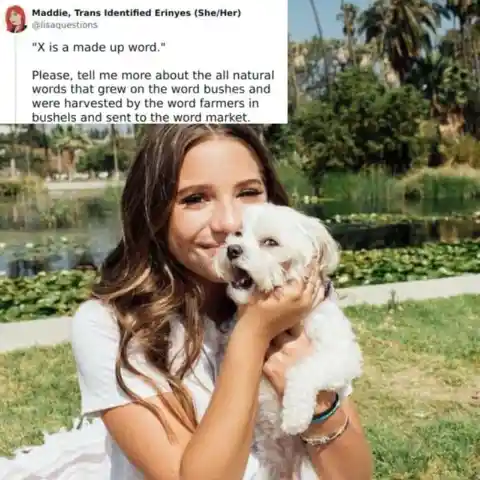
In order to facilitate communication, humans devised linguistic systems, making every word in every language essentially fictional. In nature, you won't find any terms that are considered "natural." Humans have an astounding capacity for inventing new forms of communication, yet none of these systems can be discovered in the wild.
The Plurality Of It All
The original poet of this poem is unknown, but they made some excellent points that are worth considering here. Inexplicably, the plural of "moose" is not "meeses"! We need a plural form of "house," so why isn't "hice" a valid option?
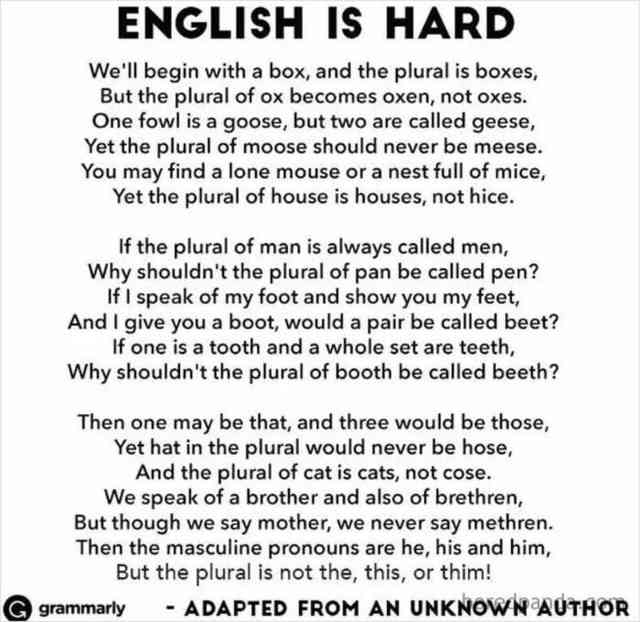
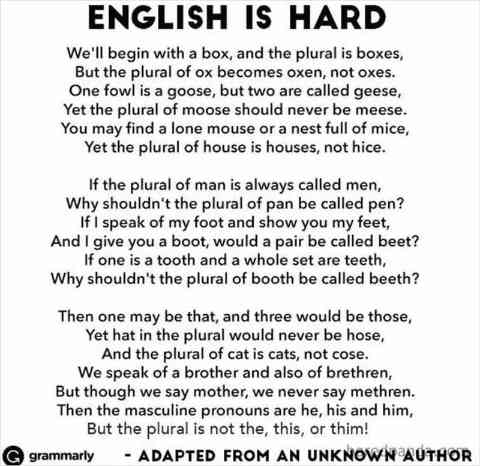
The plural form of a noun in English varies widely because it relies on the ending of the word. A further factor contributing to the ambiguity is the Latin origins of several nouns. You've got to admire the human ability to communicate, especially when it comes to figuring out English.
That Is A Great Rule
So when making rules, you need to be specific. When you want to learn English, the only rule is that there are no rules—but the spelling in this post is off and a little bit comical, to say the least. We hope that they are just kidding.
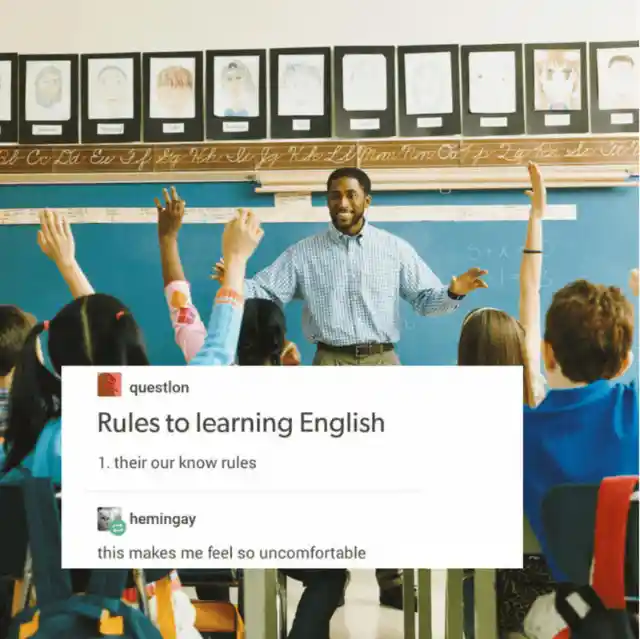
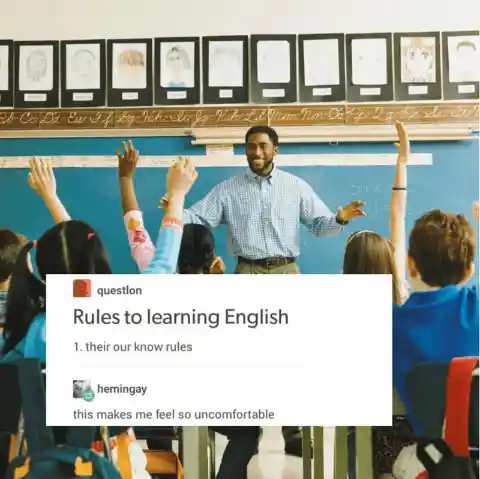
This phrase was enough to make Hemingway feel uncomfortable, which is too funny. Sometimes we find humor in the pain of others, and maybe that was what the author of this post was after, or else their English teacher will be in a lot of trouble.
Same Boat
Give it up to the people who want to learn a new language. You have to be pretty smart to retain enough information to learn the vocabulary of a foreign language. This is because it takes skill and practice to master a new language.


We spell "yacht" in English since it’s a word that came down from German. One Twitter user rightly pointed out that English learners are superheroes because they persist in learning how to spell things that have no relevance to their lives.
You Read That Differently
CHLO had a point when she posted this. You know that the spelling is the same, and she did use the same word—but we bet you read the two differently. It’s one of those little tricks our English-burnt brains had to come up with to survive this nonsense.
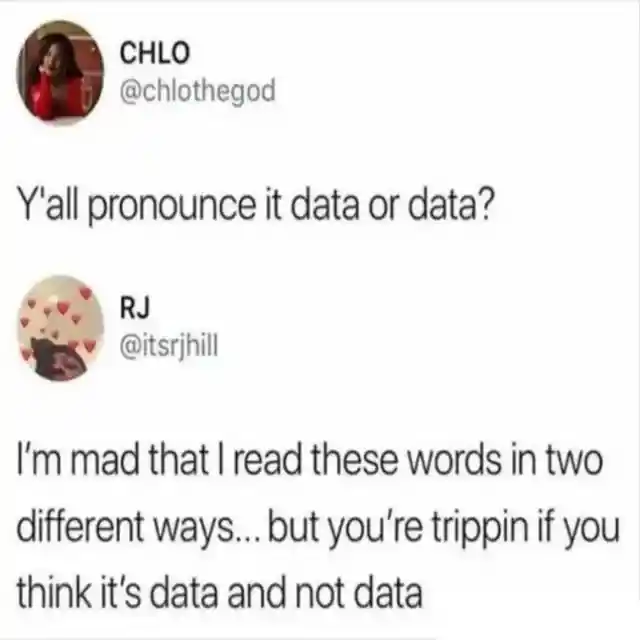
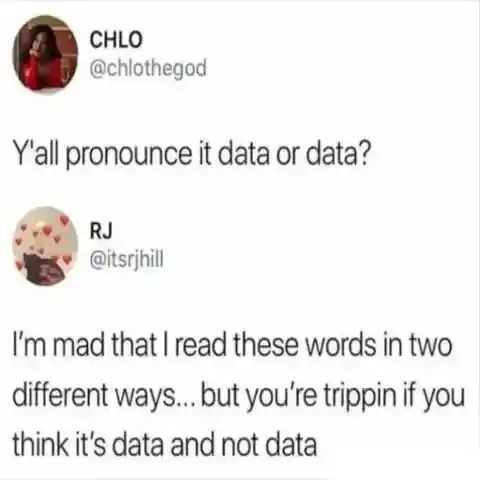
So do you think that RJ is right? Do you also pronounce it as data and not data? However, you said this in your mind, so maybe there is no way of convincing you that one is more “correct” than the other. Let’s just all agree to disagree in the meantime.
Baked Naked
This Twitter user posed a subject that many people have pondered for years. Unlike "baked," which is spoken with a single syllable, "bake-d," the word "naked" is pronounced with two syllables, like "nak-ed." You'd assume that because they both finish with the same letter, they'd be pronounced the same way. However, they are not.


Linguists have hypothesized that the pronunciation differences are a result of Old English's impact. Old English often pronounced the "-ed" at the end of words, and certain words, like "naked," have maintained that sound. The way people actually used the language on a day-to-day basis caused it to evolve through time. And so, two distinct pronunciations of "-ed" nouns emerged!
The South Is Out Of Control!
Southern bells are really pretty to look at, but just do not hang too long in the south because when you do, you start speaking their language—and their English is full of contractions. Just look at what farmsuggestion from Rumbler roped up in his sentence.

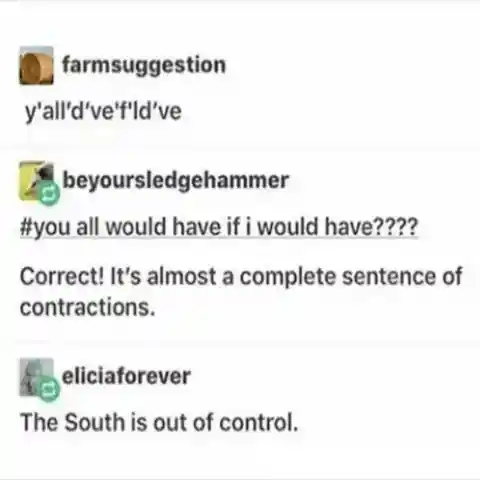
Obviously, not everyone will be able to read this statement, but some Tumblr users claim that anybody from the South will have no trouble. When translated literally, "Y'alld've'f'ld've" means "You all would have if we would have," and we can't believe how much sense it makes. Whoever read that and understood it without having to look it up is a genius—in a sense.
Just Read That
So this tongue twister is quite the ride. So if you read “read” as the past tense of “read,” then do you go back and re-read what you have read? Are you in the same situation as the one who posted this meme? Because honestly, this is all very relatable.


The word "read" is spelled precisely the same as when it is in the past tense, but it is spoken as "red." Because of this, we might refer to these two terms as a heteronym. So did you get all of that, or should you read it again?
No Fs Given
Did anybody get that? Did anyone catch the moment when the language we knew suddenly morphed into an entirely different language? Just look at this post. Some people argue that the English language is deteriorating—but we argue that it’s just mutating into a horrible monster.
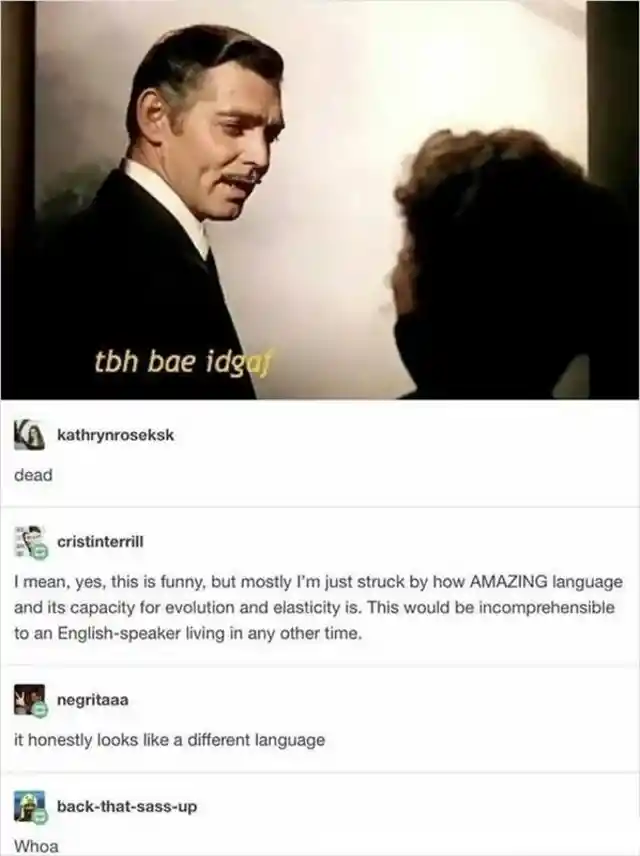
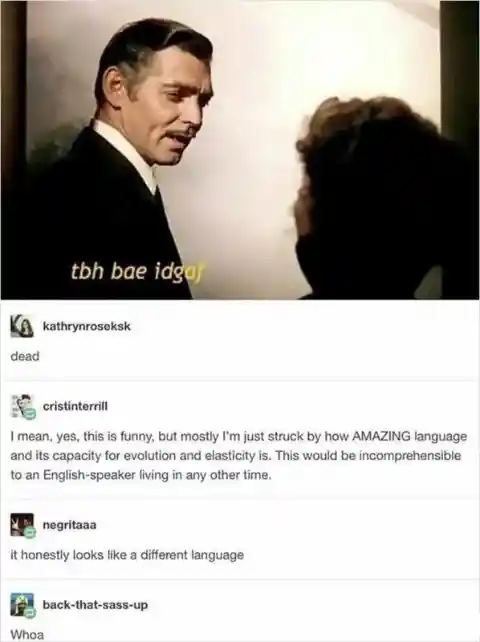
Someone was astute enough to realize that the sentence needed to be updated for a current audience, so they substituted "tbh bae idgaf." This is a fascinating take on the sentence; it conveys the same meaning as the original but seems to be written with the punch of the parlor of today’s youth.
Those Are Different People
How many names can sound the same? We bet that this does not happen in any language except for English. A few letters here and there, and you would think it would be read differently, but no—English is too special for that. It prefers to say these completely different names the same way.


These three spellings are pronounced identically since, in English, all vowel combinations produce the same sound—apparently! The astute Twitter user used these vowel combinations in the word "yawn" to emphasize their argument about the name “Sean/Shaun/Shawn.”
Rhyming Words
So this one is difficult because if you are just learning the English language, you will read bologna differently, but if you are a native speaker of the language, you would know that bologna rhymes with pony and will be fine with that.
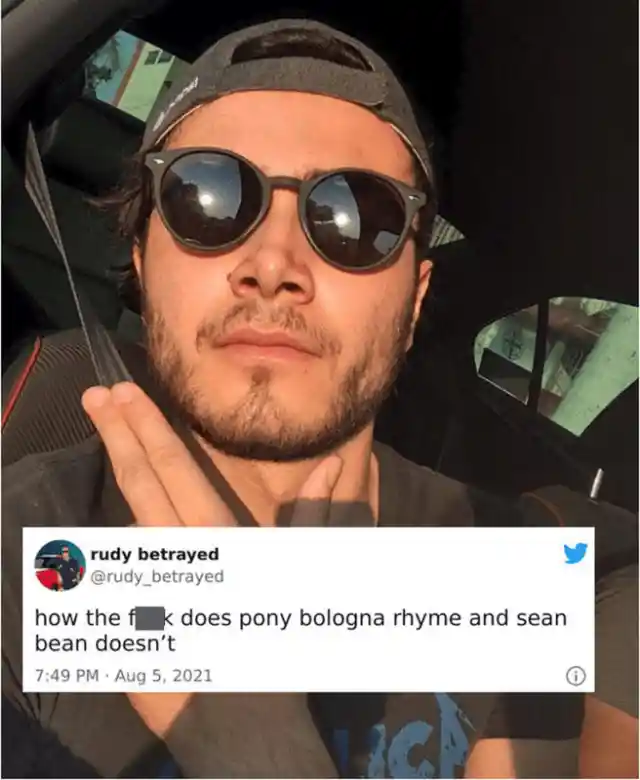

But the thing that seems unfair is that those words rhyme, although none of them should be pronounced as such. But “Sean” and “Bean” have only one letter to set them apart, but they still do not rhyme. Where are the language police? This should be illegal!
You Say “Potato”
The most ludicrous but grammatically correct spelling of "potato" was devised by some mad person. But they managed to pull it off, and it's a miracle! You'll notice as you peruse the list that the most esoteric words that have the same letter combinations as "potato."
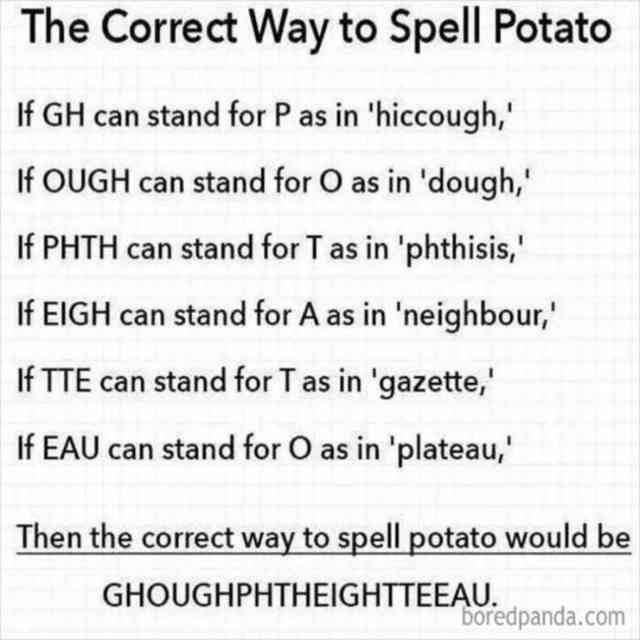
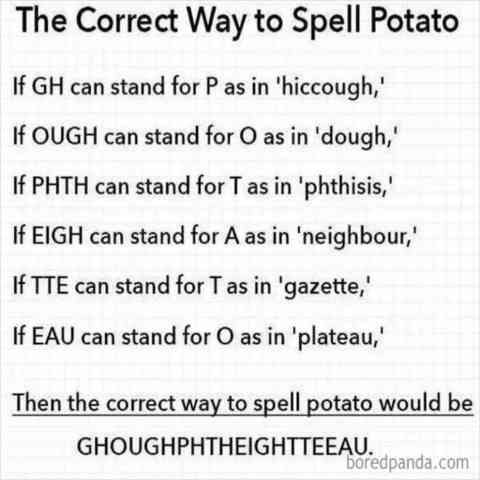
They take the best elements of other words and put them together to form a new 20-letter word that is (allegedly) pronounced "potato." We applaud the originality, but we predict that this won't become common among native English speakers any time soon.
Ain’t That A Thing
So we should refrain from cursing out but seeing as we are speaking English, we should be specific on what we mean when we say a particular word that could mean two different things when said in a different way or when it is implied differently.


One of the words can be used negatively or as a synonym for "very awesome." What the heck?! Well, it depends on the context. It depends on the situation in which it is used, just like any other swear word. We advise you to take caution when using this word as you might not be understood as you intended.
Math Is Hard
In his post, this Tumbler user expresses frustration at the fact that printed versions of numbers can differ wildly from one another. For instance, why is it spelled "forty" and not "FOURty," considering that "four" is a lower number and "forty" has the same pronunciation as "four"?


There isn't a simple solution to any of these issues. Possible explanation: language changed through time to accommodate real-world use. Since certain conventions for spelling numbers appear to have stuck while others have not, it is difficult to know what to do.
English Nonsense
Kevin here came to the realization that the spelling of “fiery” is very strange indeed and that it does not make sense according to the principles that we use to spell other modern English words. Why isn't the word "fiery" spelled with an extra "y"?
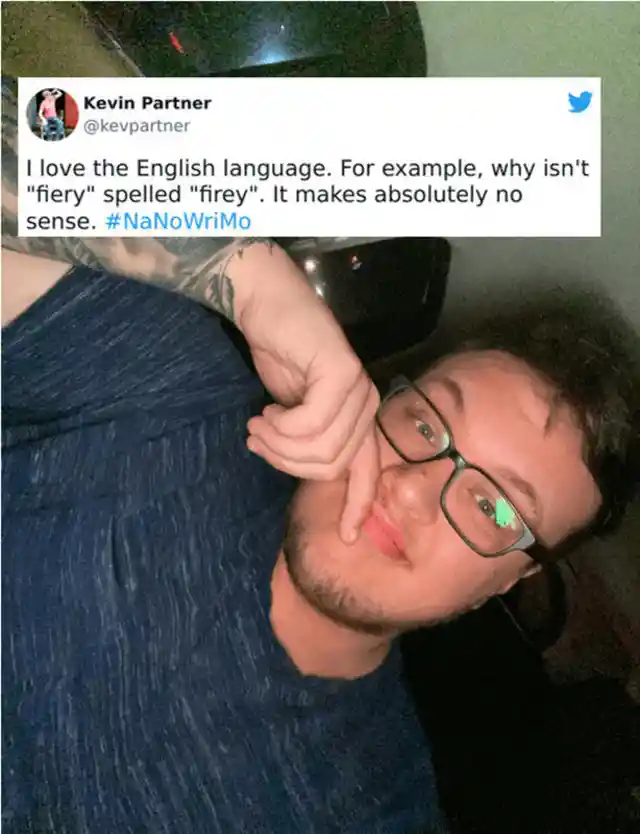
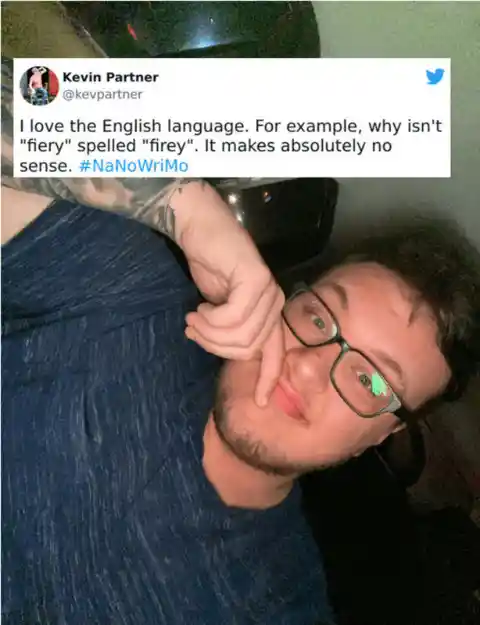
Back in the day, the word "fire" was really spelled with an "i-e" in it. According to The Grammarphobia Blog, the term was spelled "fier" in Middle English; nonetheless, the spelling "fiery" has survived the test of time and is used in Modern English—for some reason.
Are There Fake Words Here?
When learning the English language, one thing you can do to help things move along is to read up on some of the English stories. But there are times when you come across a word that is so unfamiliar you would think that it is fake.
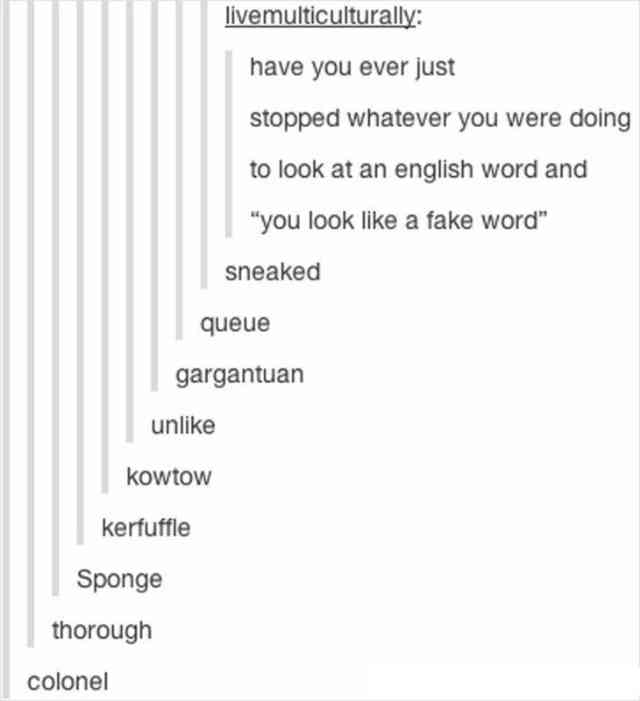
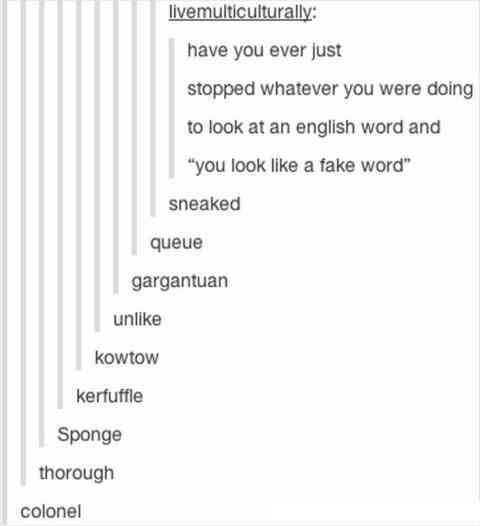
The words listed above are a hundred percent real—but if you give it enough time, you might second guess yourself. To validate their authenticity, you can check the dictionary. That should put your mind at ease—and while you’re there, you might also learn new words.
The Beach Or Gym?
Other points of confusion about the English language are words such as “mussel” and “muscle,” which are pronounced the same way. We admit that they both start with the M sound, but that should be where it ends—but unfortunately, this is not the case.
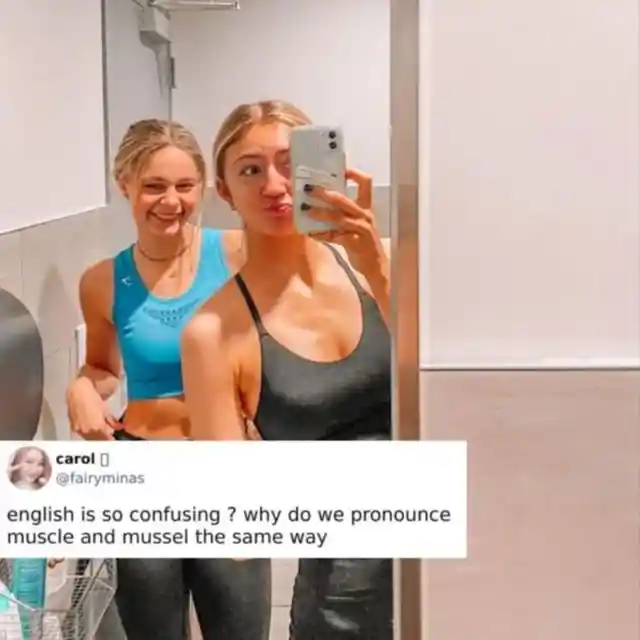
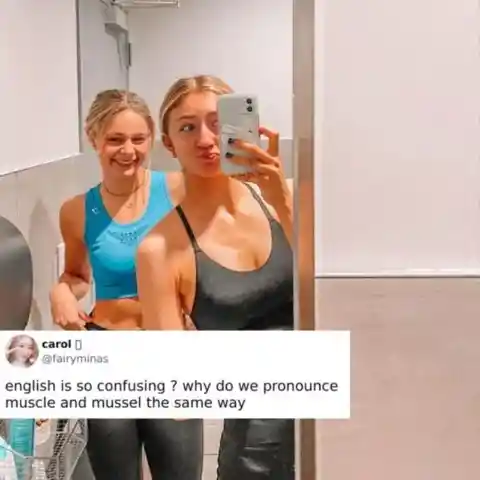
Musculus, from which we get "muscle" and "mussel," is a Latin term that has many interesting derivations. Since a mussel (we're not etymologists, so don't quote us on this) is essentially simply a living, breathing muscle encased in a shell, it stands to reason that the two terms have the same etymological origin.
Initials On The Dotted Line
When the spelling of a word doesn't make sense, little kids learning to spell are the best people to point this out. Maddy wrote on her blog about a cute thing a little kid at her work did. One of her students was practicing spelling, so it looks like she works as a teacher or tutor.
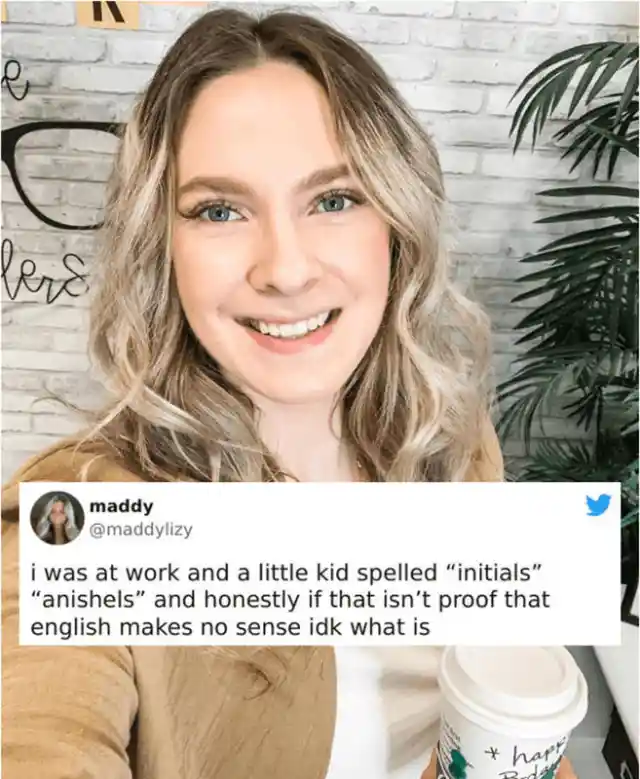
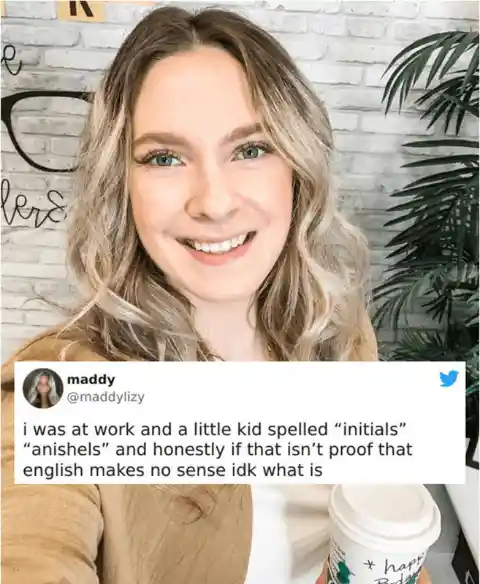
This little kid spelled "initials" as "anishels," and we can understand why they did that. It makes sense, in a way. The wrong way to spell it makes all the right sounds, so why shouldn't it be spelled that way? We like this kid because they sound like a creative soul.
Base Line
It’s pretty well known that in English, words that are spelled differently can be pronounced the same way. Take, for example, the words “bass” and “base.” These two—one a musical instrument and the other a place—are pronounced with an elongated “ayy.”
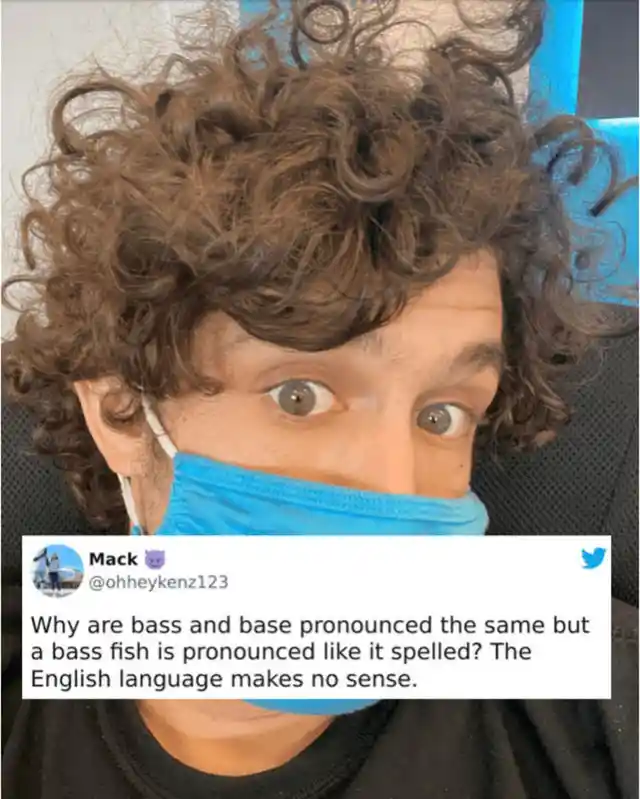
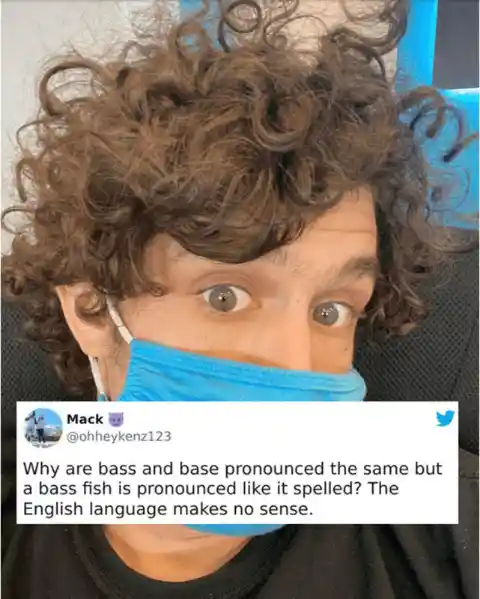
When the word "bass" is said with a short "a," it means a type of fish. There are different ways to say and write these words in English because one of them comes from the Italian word "basso," and the other comes from Middle English. One thing is for sure—a bass can be tuned, but you can't tuna fish.
She Knows
This Twitter user is clearly frustrated with English. Something as simple as spelling the word nose should not be complicated, but of course, English has to complicate things. So instead of going with the obvious choice of spelling it with a “z,” it went with “s.”
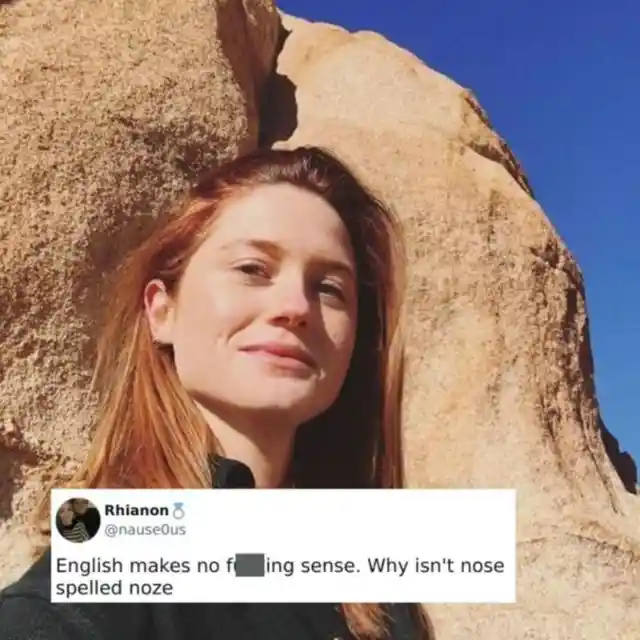
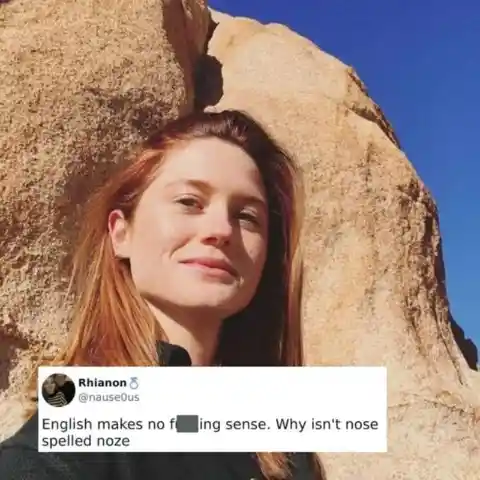
Since we use our noses daily, we were curious and checked it up. Speak More Clearly claims that when it follows a vowel, the letter "s" should be pronounced as "z." That's why it seems like "nose" ought to be called "noze."
English Owes Us An Explanation
Perhaps one of the most perplexing aspects of American English is the fact that "Kansas" and "Arkansas" are pronounced differently from one another. Nobody appears to be able to explain it! Why are their spellings so similar when they have quite distinct pronunciations?
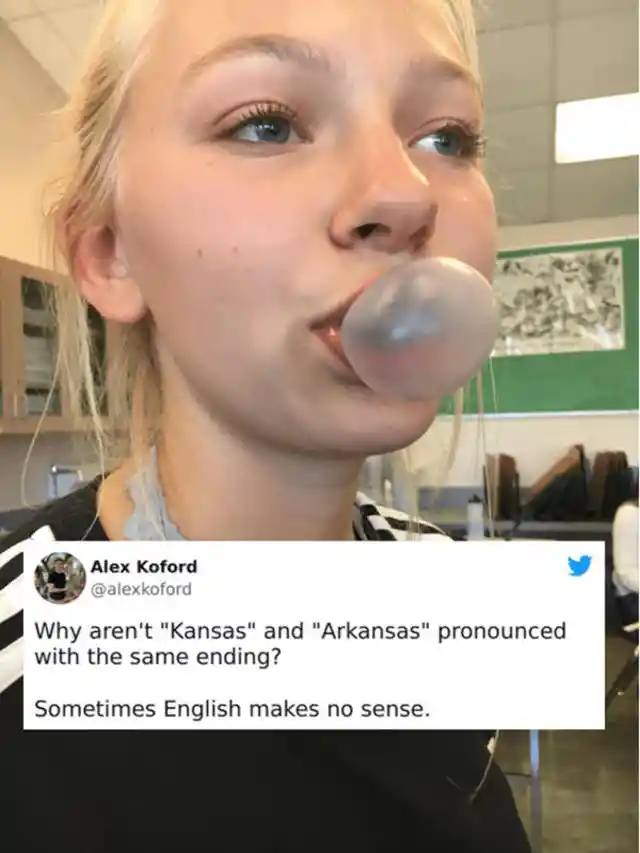
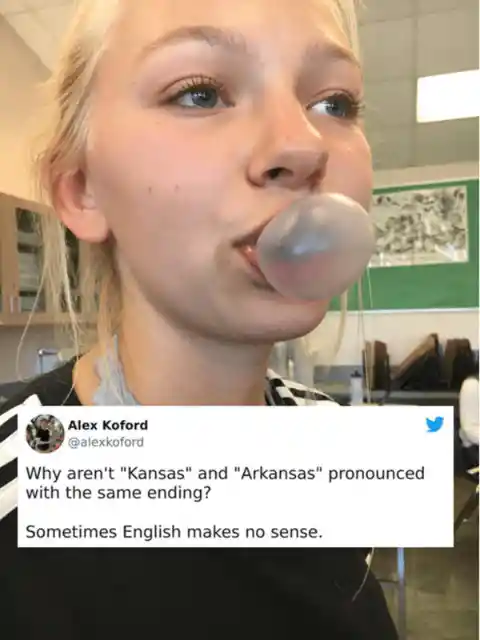
It has come to our attention that the people in the United States pronounce these two terms differently from people in other countries due to an intriguing historical reason. To put it simply, we owe a great deal of gratitude to the French when it comes to pronunciation. Sacred blue!
We Said We Paid!
Here is another example of two words that should have sounded the same because the only difference between the two words is the consonant letter that is in front of the word. But that would be too easy—and English likes to be more complicated than that.
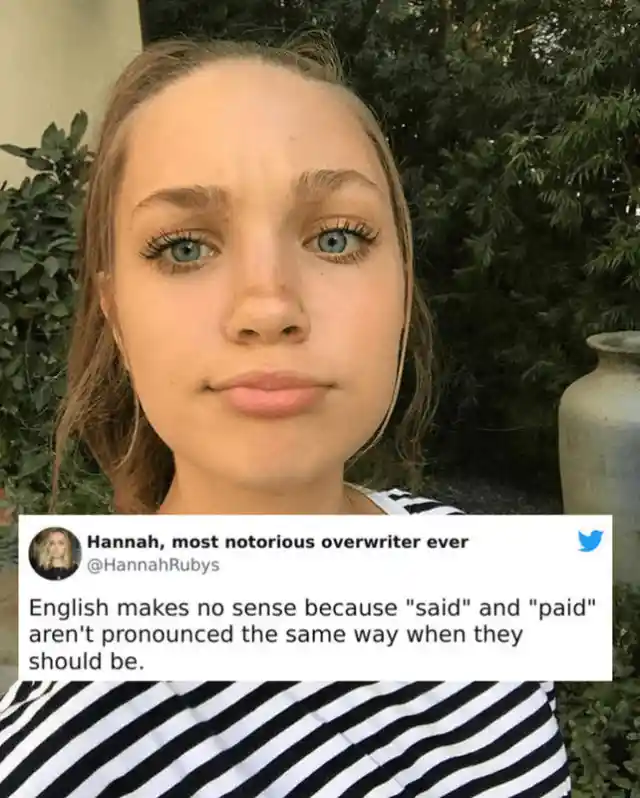
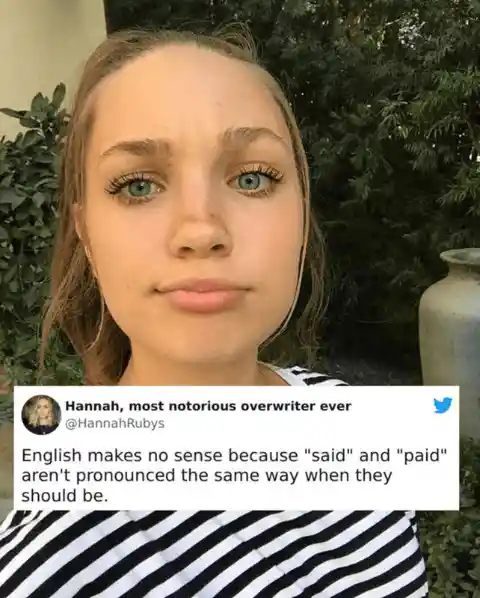
It should rhyme, but it does not. This is how the ancient English speakers paid for their freedom of speech—words that are almost alike but are entirely different when it comes to pronunciation. Well done, English, well done.
Have A Great Day
Somebody was trying to call attention to a term they believed should be written differently, but they ended up calling attention to a frequent spelling error. Since "grate" isn't a word on its own, they wondered aloud why "grateful" isn't spelled as "greatful." When a true term already exists, there's no need to invent a phony one.
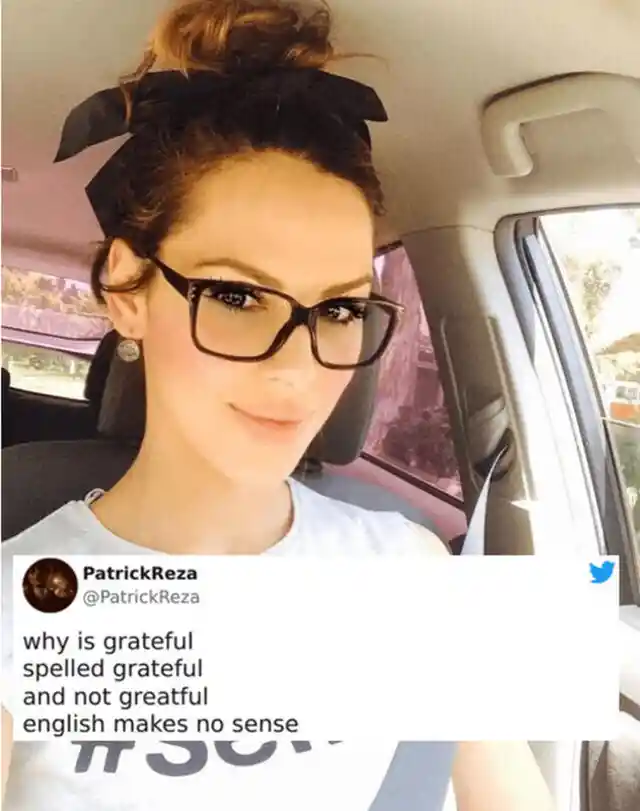

However, there is a rationale for this spelling. The adjective "grateful" derives from the noun "gratitude," which refers to an attitude of appreciation. Being appreciative fills you with overflowing positive emotion. It's easy to see how someone may make that mistake and come to the same conclusion as this poster.
Triple Contractions
Yes, it's true; the English language is becoming more bizarre at an alarming rate. In contrast to the usual contractions we have to suffer on a daily basis, now a whole statement can be said in a flash with one of these crazy English tricks. Don’t try this at home!
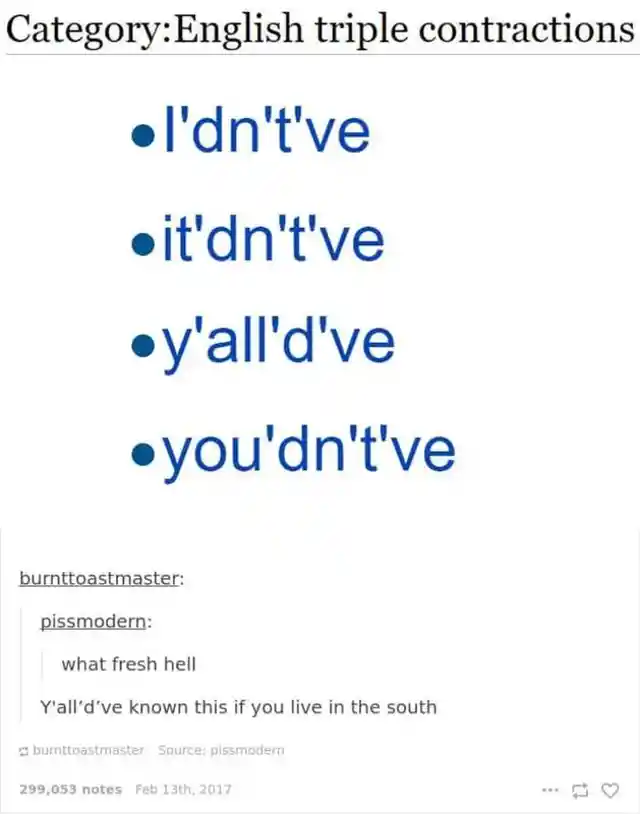
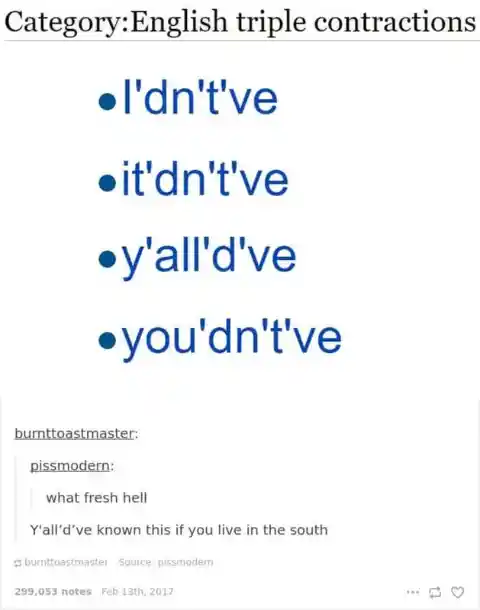
Some examples of triple contractions are the four listed above. Living in the South is a requirement for understanding these contractions, but we believe y'all would have figured it out already! Triple contractions are common in everyday speech, although it still looks strange when written down.
Knowing Is Not Knowing
In school, we learn many spelling and grammar norms, but we forget them in the real world. Everyone in the English-speaking world observes implicit language laws. Matthew Anderson tweeted a book extract on a linguistic discovery.
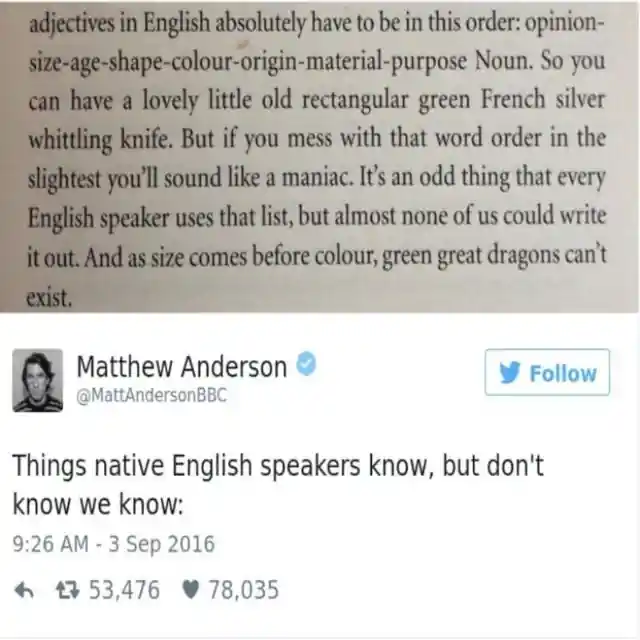
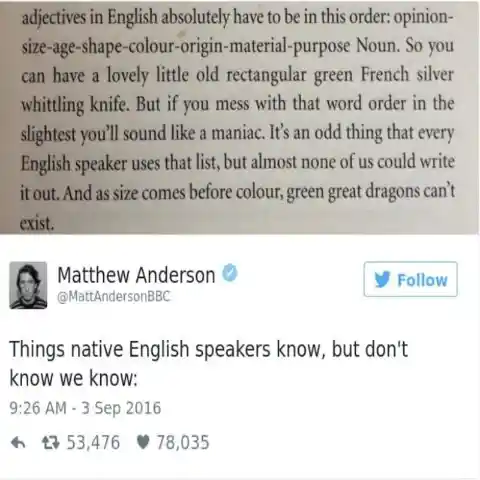
This book demonstrates how we all use the same language form to describe something. Unconsciously, we list adjectives in this order: "opinion-size-age-shape-color-origin-material-purpose" Noun.” Apparently, English native speakers will know when an adjective is placed in the wrong order. Do it! Change the words in a phrase to see what happens.
Will He Smith?
Star Wars fans have a reference for this post, which involves the famous actor Will Smith. It must be nice that your name is so familiar to others or that it has actual meaning in the English language, which means that people can use it in a sentence.
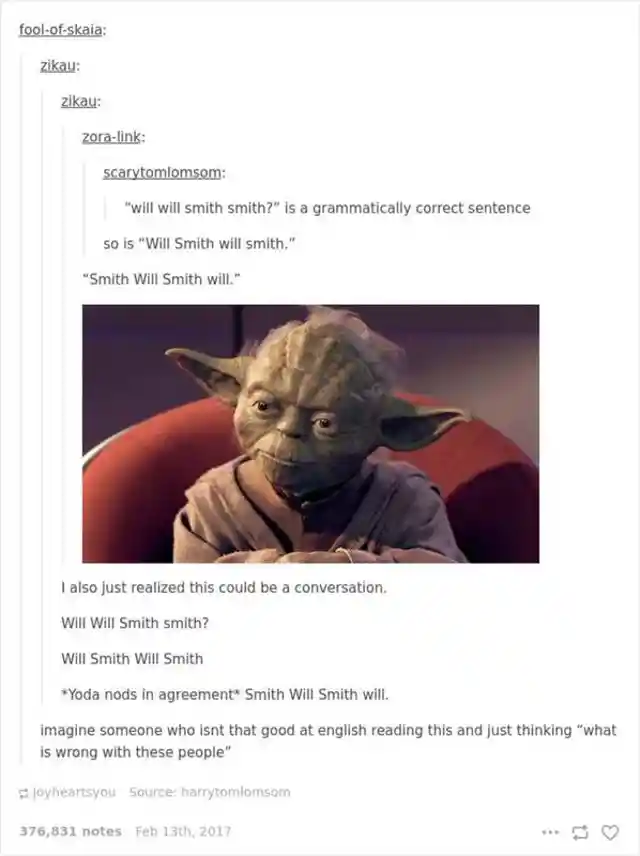

These “totally coherent” sentences are fascinating. Everything depends on the speaker's or reader's choice of emphasis and pauses. It's amusing that one poster turned it into an entire discussion. A person trying to learn English would probably see this and get completely confused.
Learning English Is Hard
These sentences prove that English is out of control. Someone compiled phrases illustrating how context and tempo affect the reading of the exact same words. These 21 phrases are full of homographs—or similar-sounding words with various meanings. Did that spin your brain too?
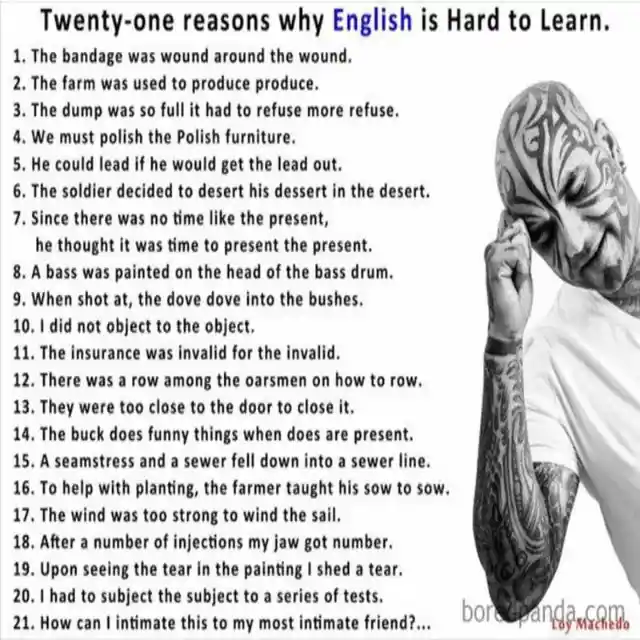
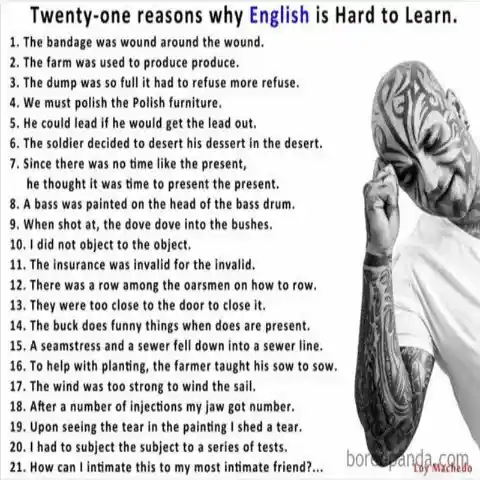
These phrases might be difficult for you if English is your second language or if you don't know the context of certain terms. Some of these lines, like #7, include homographs, which are tricky. Invent your own sentences if you're a word geek.
English Is The Bomb
English, Drea concluded, is the worst language in the world—and she wants to make it known. It's easy to see why she's so upset, even if you disagree with her. She then wonders aloud why the terms "bomb" and "womb" aren't pronounced similarly. Given that they are spelled identically, save for one letter, one would expect them to rhyme.
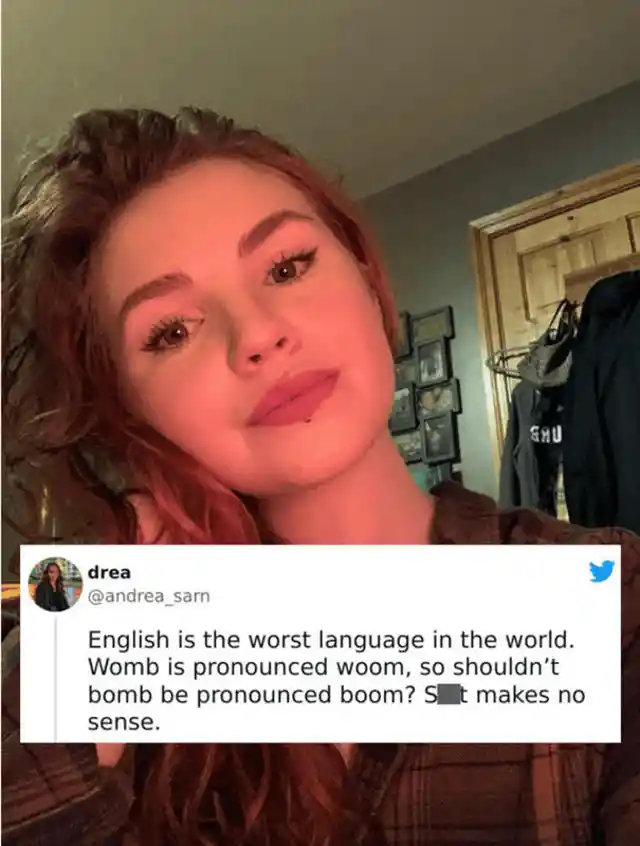
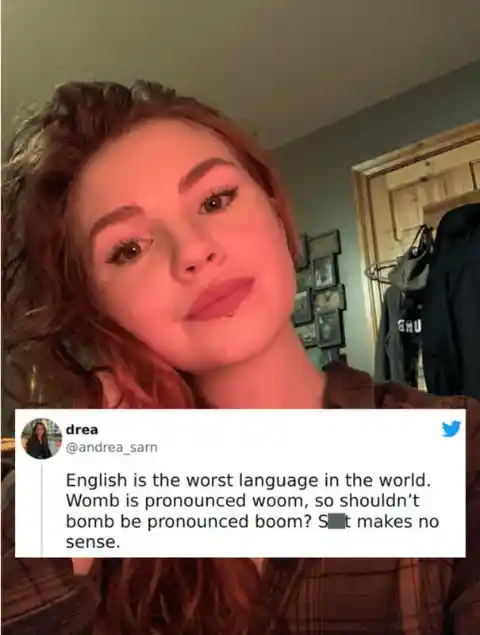
We had to investigate the difference in pronunciation between these two nouns. Apparently, "bomb" has a Latin origin, whereas "womb" comes from German, according to John Kerpan on Quora. For this reason, their base terms are the same, yet their final forms are distinct. You ought to respect those lexophiles’ extensive knowledge, vocabulary, and expertise.